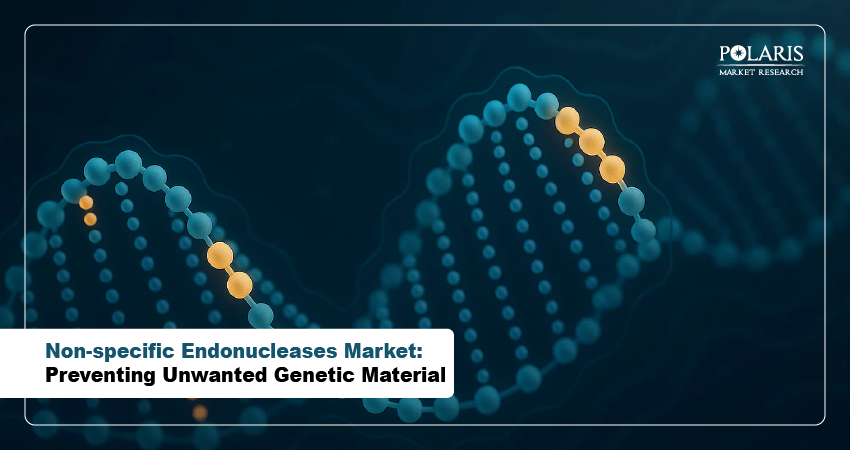Non-specific Endonucleases Market: Preventing Unwanted Genetic Material

Enzymes enable various chemical reactions in molecular biology. Among them, endonucleases are enzymes that cut the bonds inside DNA or RNA strands. These enzymes are important to study and modify genetic material. They are also essential for DNA repair, molecular testing, and producing biopharmaceuticals.
This blog post explains all that you need to know about the non-specific endonucleases market. It covers the action mechanism and biological roles of these enzymes. The key stats and factors shaping the market landscape have also been detailed.
What Are Non-specific Endonucleases?
Nonspecific endonucleases (NSEs) are enzymes that cleave internal linkages within DNA or RNA. NSEs do not require specific sequences of nucleic acid for activity. Instead, they break down any nucleic acid in an exposed area. NSEs have metal-dependent active sites, meaning they require metal ions such as magnesium or manganese to be active. NSEs can degrade nucleic acids in both single-stranded and double-stranded forms, making them suitable for applications that need complete nucleic acid removal or degradation. An example of an NSE is Benzonase. Benzonase digests all types of DNA and RNA into small fragments. Other common examples of NSEs include DNase I and Micrococcal Nuclease.
What Are Key Market Metrics?
The non-specific endonucleases market is expected to witness significant growth, according to our latest analysis. The market stood at USD 353.60 million in 2024. It is projected to account for a CAGR of 6.15% between 2025 and 2034.
The global investment in healthcare and biotech research has increased. This, in turn, has increased molecular biology studies. In addition, the rising prevalence of genetic disorders has created an increased demand for diagnostic research, impacting the non-specific endonucleases market favorably.
How NSEs Work?
As mentioned earlier, NSEs cut up DNA and RNA molecules. DNA and RNA are based on repeating chemical units called nucleotides. The linking of these chemical units is in the form of beads on a string. NSEs target the bond between nucleotides. They attach to the stands and break them into smaller fragments.
These enzymes differ from specialized enzymes that recognize specific sequences in the genetic code. Instead, they cut wherever they can locate accessible bonds. The non-selective action means NSEs can remove undesired genetic material from complex biological mixtures in an effective manner.
NSEs necessitate the correct working conditions for optimal performance. Metal ions are essential for the activation of the catalytic sites of these enzymes. Also, they work best within a specific temperature and pH range. The resulting fragments after the breakdown of the DNA or RNA are inactive and harmless. They can no longer replicate or interfere with production processes.
Why Are NSEs Important?
NSEs aren’t just tools focused on lab work. These enzymes are present naturally in several living organisms. They are highly important to maintain biological balance.
These enzymes facilitate the removal of damaged or unnecessary DNA in animals and humans. That way, the development of unwanted genetic material is prevented. They are a part of the immune defense system in bacteria. They break down foreign DNA from invading viruses or other harmful elements. NSEs are released by microbes for the decomposition of genetic material from dead organisms. They help recycle nutrients and maintain a healthy ecosystem.
Where Are NSEs Used?
Ensuring Product Purity
Living cells can be used to produce medicines such as vaccines and therapeutic proteins. The production process may leave small traces of the cell’s DNA in the final product. The complete removal of the residual DNA is important before the medicines reach patients. NSEs improve the pace at which this is carried out. Their ability to break down leftover DNA and RNA helps manufacturers to meet global standards. These enzymes also make sure that medicines are pure and stable.
Manufacturing Gene and Cell Therapies
The cell therapy and gene therapy market is growing. These therapies often make use of viruses for carrying healthy genes into patient cells. However, the production process may result in unwanted genetic material from host cells getting mixed with the therapeutic product. NSEs function as precision cleaners. They remove impurities and ensure that gene therapy products are pure and of high quality. Their role is becoming increasingly important as these advanced treatments are used to combat complex diseases.
Supporting Vaccine Production
Non-specific endonucleases are used during the production of mRNA and viral vector vaccines. Here, they eliminate unwanted genetic material from host cells or bacteria. This makes sure that the vaccines meet the required safety requirements and provide consistent results. The rise of the mRNA vaccines and therapeutics market has shown the importance of enzymes in modern vaccine development.
Laboratory and Diagnostic Use
NSEs are also used in research and development. Here, they remove excess DNA or RNA from test samples. This reduces contamination and makes sure that results are accurate. NSEs also find uses in synthetic biology. They are used by scientists for designing and constructing new biological systems. In synthetic biology, the enzymes help clean up experimental samples and improve consistency.
Conclusion
Individuals may not be that familiar with non-specific endonucleases as compared to CRISPR or other advanced gene-editing tools. However, they are essential in modern biotechnology. The ability of NSEs to effectively break down DNA and RNA makes them useful in applications that need biological products to be safe and reliable. With rising innovation in biotechnology, non-specific endonucleases are expected to become increasingly important for new biomedical advancements. The non-specific endonucleases market is expected to see increased partnerships among biotech companies and research institutions in the years to come.

